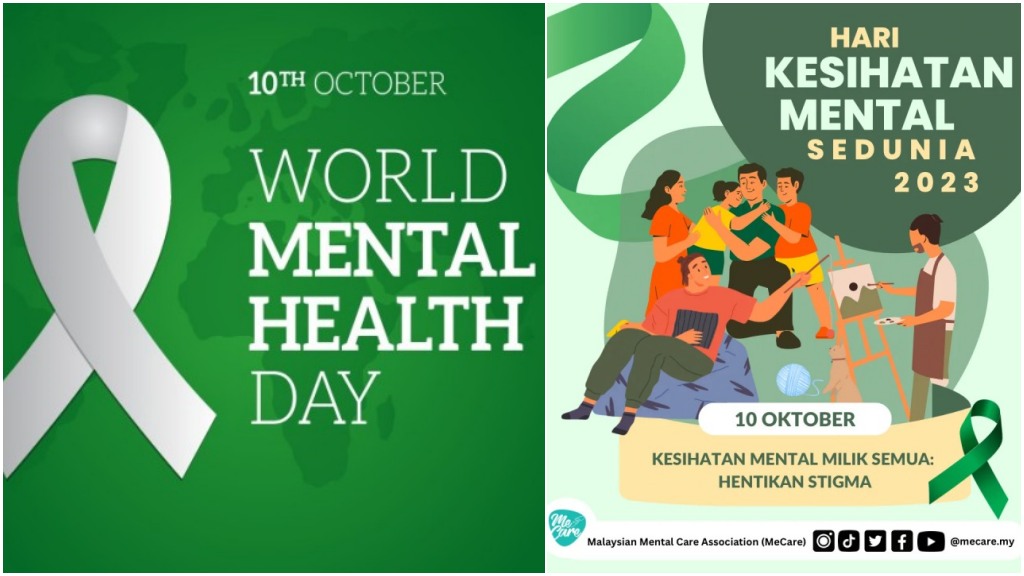
By RAJALAKSHMI A/P GANESAN
Taylor's University
The awareness of mental health in Malaysia has experienced significant growth over the past decade, marked by a series of crucial legislative and institutional developments.
In particular, the enactment of the Allied Health Act in 2016 represented a pivotal moment in the country's approach to mental health care.
This legislation introduced licensure for mental health care practitioners, ensuring that professionals in this field meet stringent standards of competence and ethics.
The establishment of the National Centre of Excellence for Mental Health under the Ministry of Health (MOH) in 2022 also marked a significant milestone in controlling and coordinating mental health services across both the public and private sectors.
In line with these developments, the recent passage of a bill for the decriminalization of suicide this year demonstrates a forward momentum towards recognizing and addressing mental health issues with empathy and compassion.
As of the present, there are 1,161 health clinics at the primary healthcare level, 60 hospitals, four mental institutions, and 34 Community Mental Health Centres (MENTARI), making mental health services are consistently accessible throughout the country.
There are also 52 active non-governmental organizations (NGOs) dedicated to community-based activities and advocacy for mental health. These organizations play a pivotal role in fostering awareness, reducing stigma, and promoting mental health initiatives on a grassroots level.
However, despite these significant strides, there remains a substantial journey ahead in the realm of mental health in Malaysia. The persistent stigma and discrimination associated with mental health issues continue to pose formidable challenges.

As of December 2017, the Ministry of Health reported that a staggering 29.2% of adults aged 16 and above—equivalent to one in three adults—and 12.1% of children in Malaysia were experiencing mental health problems.
The National Health and Morbidity Study (NHMS) conducted in 2019 revealed that nearly half a million of the country's population were grappling with depression.
Astonishingly, despite the prevalence of mental health issues, it is estimated that only 20% of Malaysians with a mental disorder will seek professional care. Social stigma remains a predominant factor contributing to this underutilization of mental health services.
Achieving a healthy and resilient society in Malaysia hinges upon addressing two critical obstacles.
Firstly, there is a pressing need to enhance the availability, accessibility, and affordability of mental health care services across the nation.
Secondly, it is imperative to raise awareness and instill the understanding that mental health is an inherent human right.
Individuals are not only entitled to mental health treatment but should also view it as a normal and necessary aspect of healthcare, akin to seeking medical assistance for a physical ailment.
By empowering people to embrace mental health care, we enable them to exercise their human rights and strengthen their overall well-being.
It is imperative that we recognize the value of instilling the habit of seeking help from a young age, whether through parental guidance or educational institutions, as a proactive measure to enhance overall mental well-being.
As the saying goes, "You can lead a horse to water, but you can't make it drink."
To initiate this change, schools play a pivotal role. Traditionally, visiting a school counselor has often been associated with punitive measures for students displaying behavioral issues or seeking career advice during their academic journey.
To break this stereotype, schools must reposition counseling services as a valuable resource for personal growth and self-improvement.
By shifting the narrative surrounding counseling, students can be encouraged to view it as a proactive step towards enhancing their overall well-being.

This shift in perspective can be achieved through various means such as schools proactively educating students, parents, and teachers about the importance of mental health.
This includes clarifying the role of school counselors as professionals who can provide guidance, emotional support, and tools for personal development.
Students should be taught that seeking help for mental health concerns is as normal as seeking medical help for physical ailments.
Schools should also establish a routine for students to engage in counseling sessions. These sessions need not be exclusively problem-focused but can also encompass discussions on stress management, coping strategies, and personal development.
Implementing peer support programs can also be effective in normalizing and ensuring a safe space for conversations about mental health.
Educators and school staff should receive training on recognizing signs of mental distress in students and how to provide initial support or referrals.
Parents should also be encouraged to actively engage in discussions about their child's mental health and well-being.
Finally, sharing stories of individuals who have benefited from counseling services can also inspire students and demonstrate that seeking help is a sign of strength, not weakness.
By implementing these strategies, schools can cultivate an environment where students perceive counseling services as a means of personal growth, emotional resilience, and self-improvement.
This cultural shift not only destigmatizes mental health but also equips students with the tools to navigate life's challenges more effectively.
In conclusion, while Malaysia has made commendable efforts in addressing mental health issues, the transformation of attitudes towards seeking help remains a crucial next step.
By nurturing a culture of openness, acceptance, and self-improvement from a young age, Malaysia can move closer to the goal of building a resilient and mentally healthy society that recognizes mental health as an integral part of overall well-being and respects the right of every individual to access and seek mental health care without stigma or hesitation.
This cultural transformation will not only benefit the current generation but also set the foundation for a more mentally healthy and inclusive Malaysia for generations to come.
Rajalakshmi A/P Ganesan is the Programme Director and lecturer at Faculty of Social Sciences and Leisure Management at Taylor’s University. This article is the author's personal opinion.











